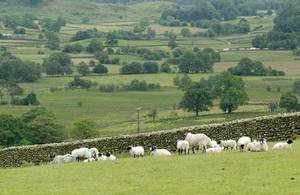Global S&T Development Trend Analysis Platform of Resources and Environment
| Bluetongue virus detected and dealt with in four imported sheep | |
| admin | |
| 2018-10-12 | |
| 发布年 | 2018 |
| 语种 | 英语 |
| 国家 | 英国 |
| 领域 | 气候变化 |
| 正文(英文) | No threat to human health or food safety 
The UK’s Chief Veterinary Officer has urged sheep farmers to remain vigilant for bluetongue virus (BTV) after the disease was picked up and dealt with in a consignment of four sheep imported from France. The Animal and Plant Health Agency (APHA) and the Pirbright Institute identified the disease as part of routine post-import testing when the sheep were brought to Lancashire. The four sheep have been humanely culled as a result. Bluetongue does not affect people or food safety. The virus is transmitted by midge bites and affects cattle, goats, sheep and other camelids such as llamas. It can reduce milk yield, cause infertility and in the most severe cases is fatal for infected animals. The midges are most active between May and October and not all susceptible animals show immediate signs of contracting the virus. Action is being taken to ensure the spread of the disease is prevented, with movement restrictions at the affected premises. This follows similar action taken for two affected cattle last month. Strict rules on the movement of livestock from regions affected by bluetongue are already in place. However, sheep farmers are strongly reminded to:
Chief Veterinary Officer for the UK, Christine Middlemiss, said:
The UK Government has worked closely with a number of groups to raise awareness of the threat of bluetongue through the Joint campaign Against Bluetongue (JAB). More information about bluetongue is available here.
Published 12 October 2018
|
| URL | 查看原文 |
| 来源平台 | gov.uk-Department for Environment, Food and Rural Affairs |
| 文献类型 | 新闻 |
| 条目标识符 | http://119.78.100.173/C666/handle/2XK7JSWQ/105870 |
| 专题 | 气候变化 |
| 推荐引用方式 GB/T 7714 | admin. Bluetongue virus detected and dealt with in four imported sheep. 2018. |
| 条目包含的文件 | 条目无相关文件。 | |||||
| 个性服务 |
| 推荐该条目 |
| 保存到收藏夹 |
| 查看访问统计 |
| 导出为Endnote文件 |
| 谷歌学术 |
| 谷歌学术中相似的文章 |
| [admin]的文章 |
| 百度学术 |
| 百度学术中相似的文章 |
| [admin]的文章 |
| 必应学术 |
| 必应学术中相似的文章 |
| [admin]的文章 |
| 相关权益政策 |
| 暂无数据 |
| 收藏/分享 |
除非特别说明,本系统中所有内容都受版权保护,并保留所有权利。
修改评论